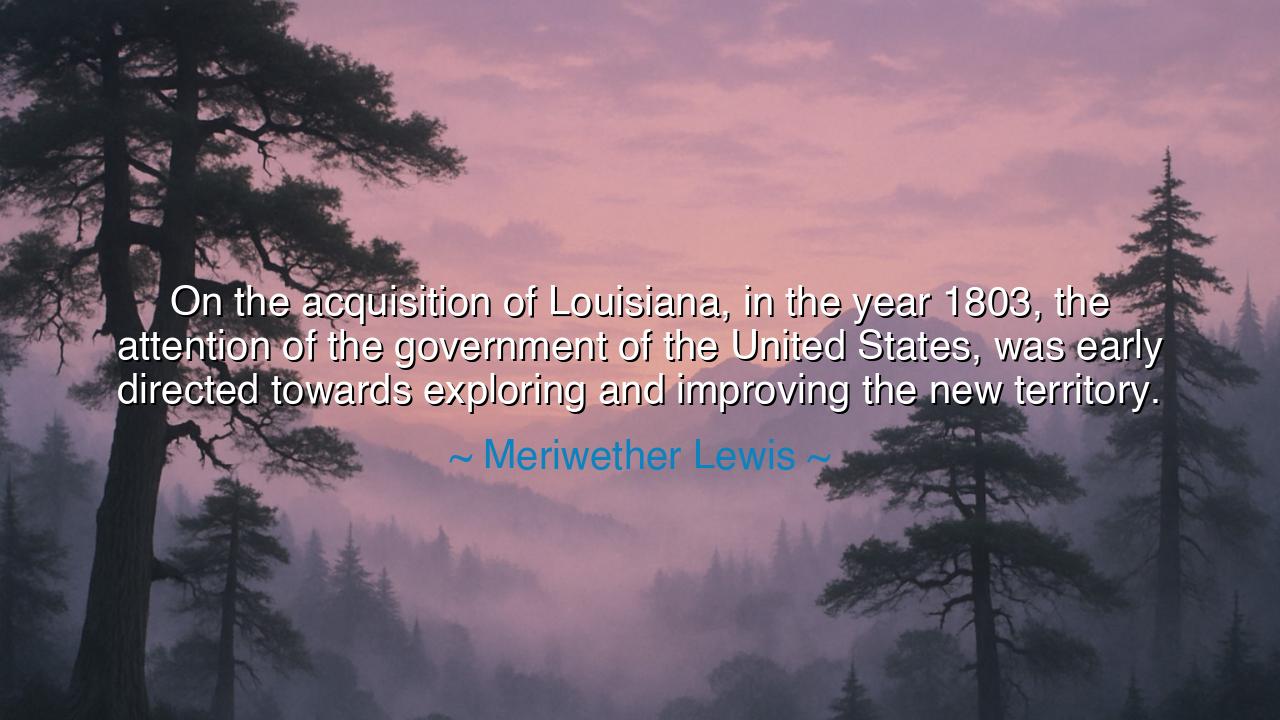
On the acquisition of Louisiana, in the year 1803, the attention
On the acquisition of Louisiana, in the year 1803, the attention of the government of the United States, was early directed towards exploring and improving the new territory.






"On the acquisition of Louisiana, in the year 1803, the attention of the government of the United States, was early directed towards exploring and improving the new territory." – Meriwether Lewis
In these stately and reflective words, Meriwether Lewis, famed explorer and co-leader of the Lewis and Clark Expedition, speaks not only of a historical event but of a spirit that defined an age—the spirit of discovery, vision, and destiny. His sentence, calm and measured, conceals within it the thunder of transformation. The Louisiana Purchase of 1803 was not merely a transaction of land between nations; it was the opening of a vast and uncharted world. With a single stroke of pen and courage, the United States had doubled its size, extending from the Mississippi River to the distant mountains of the West. Yet for Lewis, and for the young republic, this was not an end but a beginning. The true greatness of the purchase lay not in its scale, but in the nation’s determination to explore, understand, and cultivate what it had gained.
The origin of this quote comes from Lewis’s writings and reflections on the monumental task entrusted to him by President Thomas Jefferson. Jefferson, a man of both science and statesmanship, understood that to possess land without knowledge of it was to hold a treasure without comprehension. Thus, he directed Lewis and his companion, William Clark, to embark upon the great journey that would reveal the mysteries of the American continent. Their mission was not conquest, but enlightenment—to chart rivers, mountains, and forests; to study flora and fauna; and to establish friendship, if possible, with the native tribes who already called that vast wilderness home. In Lewis’s words, we glimpse the early vision of a nation that believed exploration was a duty as sacred as ownership.
To the ancients, such a quest would have been seen as divine—a pilgrimage into the unknown, guided by courage and curiosity. And indeed, for Lewis and Clark, it was just that. Their journey across the continent in 1804–1806 was one of the most extraordinary undertakings in human history. They faced starvation, storms, disease, and the constant specter of death. Yet they pressed onward, their journals filled with awe and wonder at the grandeur of creation. They were men who lived at the meeting point of civilization and wilderness, science and myth. Their expedition transformed not only maps, but minds; it expanded the boundaries of what Americans believed was possible.
The meaning of Lewis’s statement, then, extends far beyond geography. It speaks of a truth eternal in the human heart: that to possess something is not enough—one must seek to understand it, nurture it, and make it fruitful. When the United States acquired Louisiana, it inherited a promise as vast as the land itself—a promise to explore not only the territory but the potential of a young nation’s soul. Lewis’s phrase, “the attention of the government was early directed,” reveals a people not content with idle gain, but compelled to act, to discover, to improve. It is a lesson in foresight and responsibility: the greatness of a people lies not in what they acquire, but in what they make of their acquisitions.
Yet, as with all human endeavors, the Louisiana Purchase carried both triumph and tragedy. The same expansion that inspired exploration also brought displacement and sorrow to the Native American tribes who had long lived upon those lands. The march of progress was not without its shadows. Thus, Lewis’s words remind us, too, of the need for wisdom and humility in the exercise of power. Exploration must serve not greed, but understanding; improvement must never trample upon justice. The “new territory” was both a blessing and a test—an opportunity for humanity to choose whether expansion would mean enlightenment or exploitation.
Consider how Lewis and Clark’s expedition, though born of national ambition, became a testament to human endurance and cooperation. It was their friendship with Sacagawea, the Shoshone woman who guided them through treacherous lands, that ensured their success. Her knowledge, courage, and resilience turned survival into triumph. Through her, the expedition embodied a higher truth: that discovery thrives not in domination, but in unity and respect. Thus, Lewis’s statement, though rooted in government directive, blooms into a universal teaching: that exploration guided by virtue uplifts the human spirit, while exploration driven by arrogance destroys it.
The lesson of Lewis’s words endures for all generations. Each of us inherits a kind of “Louisiana Purchase”—vast unknowns within ourselves and the world around us. We too must explore, not with conquest in our hearts, but with reverence and courage. The call to “explore and improve” is not limited to geography; it is the call to cultivate the mind, the soul, and the bonds of humanity. Let us therefore, like Lewis and his companions, look upon the uncharted horizons of life with wonder rather than fear, and with purpose rather than greed.
For in the end, the acquisition of Louisiana stands not only as a chapter in history, but as a symbol of what mankind can achieve when guided by vision, duty, and hope. Meriwether Lewis’s words remind us that the destiny of any nation—or any soul—lies not in the land it claims, but in the courage with which it seeks to understand and ennoble it. To explore is to live; to improve is to honor; and to look upon the unknown with faith is to become truly free.






AAdministratorAdministrator
Welcome, honored guests. Please leave a comment, we will respond soon